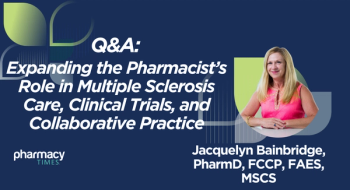
Managing Diabetes and Cardiovascular Risk Through Collaborative Care
Jennifer Goldman discusses the importance of collaborative care between providers like endocrinologists, cardiologists, primary care physicians, and pharmacists to manage diabetes and prevent cardiovascular events.
Jennifer Goldman, PharmD, CDCES, BC-ADM, FCCP, professor of pharmacy practice at the Massachusetts College of Pharmacy and Health Sciences, discusses the importance of collaborative care between providers to effectively manage diabetes and reduce cardiovascular risk. She emphasizes that while endocrinologists play a key role, all providers must take responsibility for interventions if treatment goals are not met. Goldman notes cardiovascular disease is the top risk for those with diabetes, so regularly checking risk factors through tests and conversations can help motivate lifestyle changes.
Q: Where is the role of endocrinology in monitoring lipid levels in people with diabetes?
Jennifer Goldman: I think we need to be a team, a collaborative team, and that also includes endocrinologist. So we're here at the ADA meeting, so when we think about the ADA standards of care, and very specific recommendations for the treatment of type 2 diabetes, and type 1 diabetes, and goals of therapy, so if we all need to take responsibility, but if somebody is being seen by an endocrinologist, and they're looking at the standards of care, and then not reaching those goals, somebody needs to make an intervention. So whatever drug therapy, that is, if somebody has had an ASCVD event in their goal is less than 55, then what are we going to do about it? Somebody has to take responsibility for adding drug therapy there.
Q: As a pharmacist, what recent advances in lipid therapy do you believe are most pertinent for endocrinology?
Jennifer Goldman: We need to pay attention to outcome data, and not settling for good enough because one of the things I like to challenge providers about is, what would you do if it was you, or if it was your family? We need to look at our patients that same way. We know that we can prevent cardiovascular death, MI, [and] stroke, and we have the tools to do that now. So you can't settle for good enough anymore. You have to look at those outcomes and treat people the way you want your family to be treated, and so whatever drug therapy that is that has that outcome data is what we should be using.
Q: How important is it to emphasize the role of statin therapy and other basic lipid management principles in patients with diabetes?
Jennifer Goldman: So we think about people with diabetes, they don't die from diabetes, they're going to die from cardiovascular disease. So the stain is certainly important because we have primary and secondary prevention data with with a statin, and when you look at all the new therapies, then you try the new shiny things that has outcome data, it's on a background of maximally tolerated statin. So it's an addition to statin, and that could be zero, that can be no statin, if someone can tolerate it. But so in addition to statin, so you look at the ADA standards of care, their recommendation is moderate to intensive statin therapy, and then if you don't reach your ADA goal, which would be less than 70 or less than 55, then we're going to look at the at the new shiny things to to reach those goals.
Q: How does the emerging role of Lp(a) influence risk stratification of patients with diabetes?
Jennifer Goldman: Again, we know that people with diabetes that they're going to die from cardiovascular disease, that's the biggest, highest risk. So by checking that we can look at risk. What does that conversation look like for a patient? It might change things. So it might if you have a conversation saying this is going to increase your risk plus you have these other risk factors, whether it's family history, obesity, or or another risk factor by having that available to them, that test result, that might help them motivate them, but who's responsible for that? Well, I feel like we still have to have a collaborative team, and whether that's the endocrinologist, that cardiologist, the primary care, but we should all be looking at it together to make sure it gets done.
Newsletter
Stay informed on drug updates, treatment guidelines, and pharmacy practice trends—subscribe to Pharmacy Times for weekly clinical insights.


























